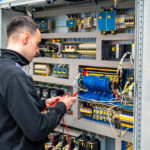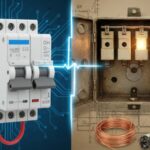Electrical grounding is a cornerstone of electrical safety, protecting homes and businesses from dangerous electrical faults. At Solid Power Inc., based in Savannah, GA, they specialize in designing and maintaining grounding systems that safeguard properties against shocks, fires, and equipment damage.
Grounding will help make sure that the excess electrical current has a safe path to dissipate into the earth, which is one of the critical features in Savannah’s humid, coastal climate where weather can stress electrical systems. With a commitment to quality and compliance with the National Electrical Code (NEC), their grounding solutions provide peace of mind for homeowners and property managers.
This article delves into the definition of grounding, its fundamental principles, home grounding systems, and the mechanics of how grounding works, offering a comprehensive guide to this essential safety practice.
What is Grounding?
Electrical Grounding, also known as earthing, is the process of connecting an electrical system or device to the earth or a conductive body that acts as a reservoir for electrical current. The primary purpose of grounding is to provide a safe pathway for excess or fault current, such as that caused by a short circuit, lightning strike, or equipment failure, to flow into the ground, preventing harm to people, animals, or property. Solid Power Inc. emphasizes that grounding is not just a technical requirement but a vital safety measure mandated by the NEC. Without proper grounding, stray electrical currents could energize metal surfaces like appliances or pipes, posing risks of electric shock or fire.
In practical terms, grounding involves connecting electrical systems to a grounding electrode, typically a metal rod driven deep into the soil. This connection stabilizes voltage levels, ensuring that circuits operate within safe parameters. For example, grounding prevents dangerous voltage spikes that could damage sensitive electronics like computers or HVAC systems. In Savannah, where coastal moisture can accelerate corrosion of electrical components, Solid Power Inc. uses durable, corrosion-resistant materials to ensure grounding systems remain effective over time. By prioritizing grounding, they help homeowners maintain safe, reliable electrical systems that meet both local and national standards.
Grounding Basics
The foundation of grounding lies in creating a low-resistance path for electrical current to follow during a fault. This path typically includes a grounding electrode, grounding wires, and a grounding bus bar within the electrical panel. The grounding electrode, often a copper or galvanized steel rod, is buried in the earth to provide a direct connection to the ground. Grounding wires, usually made of copper, connect the electrode to the electrical system, ensuring fault currents are safely diverted. Solid Power Inc. designs grounding systems to handle high fault currents, ensuring rapid dissipation into the earth.
Grounding serves multiple purposes beyond safety. It stabilizes voltage by providing a reference point for the electrical system, reducing fluctuations that could harm appliances. It also protects against lightning strikes by directing surge energy into the ground, preventing damage to wiring or electronics. In commercial and residential settings, grounding is essential for sensitive equipment like medical devices or data servers, which require consistent power quality. Solid Power Inc. follows NEC guidelines and uses advanced testing tools to verify that grounding systems meet resistance standards, ensuring optimal performance. Their expertise in grounding helps Savannah properties withstand the region’s environmental challenges, such as humidity and saltwater exposure.
Grounding System Basics for Your Home
A home’s grounding system is a network of components designed to protect residents, appliances, and the structure itself. The system typically includes a grounding electrode (e.g., a ground rod or metal water pipe), grounding wires, and a grounding bus bar in the main electrical panel. All metallic components in the home—such as outlets, circuit breakers, appliances, and plumbing—are connected to this system to ensure any stray current is safely redirected to the ground. Considering factors like electrical load and soil composition, Solid Power Inc. tailors grounding systems to each home’s unique requirements.
In Savannah’s coastal environment, grounding systems face unique challenges. High humidity and salty air can corrode grounding rods and connections, reducing their effectiveness. Solid Power Inc. mitigates this by using corrosion-resistant materials and recommending regular inspections, typically every 3-5 years, to ensure system integrity. A properly grounded home prevents electrical shocks when touching appliances, protects electronics from voltage surges, and reduces fire risks from electrical faults. Their team ensures compliance with local codes, providing homeowners with a grounding system that enhances safety and reliability.
The grounding system also integrates with circuit breakers or ground-fault circuit interrupter (GFCI) devices, which detect faults and cut power to prevent harm. For example, if a hairdryer falls into water, the grounding system and GFCI work together to divert current and trip the circuit, protecting the user. Solid Power Inc. educates homeowners on maintaining their grounding systems, such as avoiding DIY modifications that could compromise safety. Their professional grounding services ensure that Savannah homes are equipped to handle electrical demands safely and efficiently.
How Electrical Grounding Works
Electrical grounding functions by providing a deliberate, low-resistance path for excess current to flow into the earth, bypassing people, animals, and equipment. When an electrical fault occurs, such as a loose wire contacting a metal appliance frame, the grounding system channels the current through a grounding wire to the grounding electrode, where it safely dissipates into the soil. This process prevents the appliance from becoming energized, reducing the risk of shock or electrocution. Solid Power Inc. ensures that grounding connections are secure and meet NEC resistance standards, allowing fault currents to flow efficiently.
Grounding also triggers protective devices like circuit breakers or fuses. When a fault current flows through the grounding system, it creates an overload that trips the breaker, cutting off power to the faulty circuit. This rapid response is critical for preventing fires or injuries. In lightning-prone areas like Savannah, grounding is especially important, as it directs massive surge currents from lightning strikes into the ground, protecting wiring and electronics. Solid Power Inc. uses high-quality grounding rods and conductors to handle these extreme conditions, ensuring robust protection.
The effectiveness of grounding depends on proper installation and maintenance. Soil conditions, for instance, affect grounding resistance—wet, conductive soil provides better grounding than dry, sandy soil. Solid Power Inc. conducts soil resistivity tests to optimize grounding electrode placement and may install multiple rods for enhanced performance. Their grounding solutions are tailored to each property, ensuring reliable operation even in Savannah’s challenging coastal environment. By combining expertise with advanced materials, they deliver grounding systems that provide long-term safety and peace of mind.
Conclusion
Electrical grounding is a vital safety feature that protects homes and businesses from electrical hazards, ensuring reliable power distribution and equipment longevity. Solid Power Inc., based in Savannah, GA, excels in designing, installing, and maintaining grounding systems that meet rigorous NEC standards and withstand coastal conditions.
Our expertise in grounding helps prevent shocks, fires, and costly damage, making us a trusted partner for homeowners and property managers. By understanding the importance of grounding and investing in their professional services, clients can safeguard their properties and enhance electrical safety. Contact Solid Power Inc. today to schedule a consultation and ensure your grounding system is up to par.
FAQs
1. Why is grounding essential for home electrical safety?
Grounding provides a safe path for fault currents to dissipate, preventing electrical shocks, fires, and equipment damage in homes.
2. How often should a home’s grounding system be checked?
We recommend inspecting grounding systems every 3-5 years or after major renovations to ensure optimal performance and compliance.
3. Can poor grounding affect household appliances?
Yes, inadequate grounding can cause voltage surges, damaging sensitive electronics. Our grounding solutions stabilize voltage for protection.
4. What components are included in a typical grounding system?
We install grounding rods, copper wires, and bus bars, connecting all metallic components to ensure a safe current path.
5. How can Savannah residents contact Solid Power Inc. for grounding services?
Residents can reach us via our website or phone for a free consultation and tailored grounding solutions.


